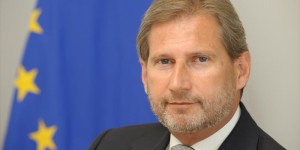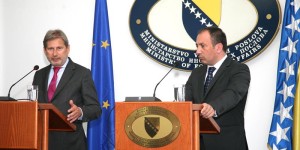“We hope that following the general elections in October there will be a
visible shift towards a clear focus on the EU agenda. The recent
demonstrations have shown that this is what the citizens want”, said Christian Danielsson, Director-General for Enlargement at the European Commission, in an interview for the daily Dnevni Avaz. Excerpts from the interview were published in the daily on 13 June 2014.
How would you explain relations with Bosnia?
The European Union, through the Council conclusions of 14 April, reiterated an unequivocal commitment to Bosnia and Herzegovina’s EU perspective. There is an accession process in place for those who want to join the EU, based on the Copenhagen criteria, and a system to support the aspirant countries, both politically and financially, to carry out reforms necessary to fulfil these criteria. The full potential of this process is brought by the Stabilisation and Association Agreements. Currently, our relations are still based on the Interim Agreement as the conditions for entering into force of the Stabilisation and Association Agreement have not been met yet.
What are your views on situation in Bosnia in terms of its EU integration path?
Due to the lack of political will in the country over the past years we have seen very little progress on Bosnia and Herzegovina’s integration path. The EU agenda does not seem to be considered a priority. We hope that following the general elections in October there will be a visible shift towards a clear focus on the EU agenda. The recent demonstrations have shown that this is what the citizens want. The EU-Delegation therefore also recently organised together with International Financial Institutions a major conference in Sarajevo for national and international stakeholders, the ‘Forum for Prosperity and Jobs’; It focused on key economic issues to create jobs, in particular for youth, improving the business environment, and fighting corruption, just to name a few issues. This is about bringing all parts of society and their suggestions in the country to the fore – change has to start from within. The conference identified a number of concrete ideas with wide support, a ‘Compact for Growth’, as kick start and agenda for change. Political parties are urged to endorse the Compact prior to elections. It is now crucial to break the stranglehold of vested interests and modernise the economy in order to boost jobs. The recent flood disaster only reinforces the need for thorough reforms and better coordination between all levels of government.
How BH officials are serious in that process. So far three meetings of committees and sub-commities were canceled due to unreadiness of BH. The last one was held without presence of all BH representatives?
The Subcommittees of the European Union and Bosnia and Herzegovina are technical meetings where experts discuss in detail the approximation process of the country with the EU. They are the engine room of our relations. Due to problems within the Council of Ministers of Bosnia and Herzegovina in arriving at a position and deciding on a delegation, five subcommittees could not take place. This was undermining the Interim Agreement and was a serious setback in our relations. The situation has now improved: Only recently, on 13-14 May, the Subcommittee on Economic and Financial issues and statistics could took place as the first of the 6th cycle. On 4-5 June we held another sub-committee on the important areas of Transport, Energy, Environment and Regional Development.
The EC and DGs are working hard on implementing projects in Bosnia. What is a worth of those projects and what are plans for this year regarding implementations of projects?
The European Commission is currently implementing projects worth more than EUR 200 million in Bosnia and Herzegovina. Of these, actions of a value of EUR 100 million are planned to be completed this year.
Overall, how much (in numbers and percents) of EU sponsored projects has been spent so far?
Between 2007 and 2013 the European Union committed EUR 610 million of IPA funds to Bosnia and Herzegovina. Roughly EUR 280 Million (i.e. around 45%) of these funds have so far been disbursed.
Currently, we are focusing all our efforts to help Bosnia and Herzegovina to deal with the consequences of the floods. In addition to immediate humanitarian aid provided so far, the European Commission has allocated an extra €65 million to tackle the aftermath of the floods in Bosnia and Herzegovina and Serbia.
Out of this, €3 million in humanitarian aid will be released to help the most vulnerable people in both countries to address their most immediate needs, in particular food, health and sanitation, first aid and shelter.
The remaining €62 million have been mobilised to respond to short to medium term reconstruction and relief needs in the affected areas. This funding is re-allocated from
previous IPA programmes and will be available by the end of June. It will include support for public infrastructure such as schools and social care services as well as basic equipment for enterprises and farms to restart their activities.
The EU is committed to continue its support also in the medium to long term with new IPA money that will be allocated for the period 2014-2020. The exact scope and amount will be decided on the basis of a comprehensive needs assessments expected in the coming weeks
Some Brussels based media and think-tanks claims DG Enlargement as well as enlargement commissioner will no longer exist after elections for Eutopean parliament. Is that true?
The structure of the Commission as well as the allocation of individual portfolios is the prerogative of the next Commission President. It would be too early to speculate on this. I can assure you, however, that enlargement policy remains a key EU policy, with a busy agenda.
To read the interview with Mr. Danielsson on Dnevni Avaz portal, click here (only BHS)



